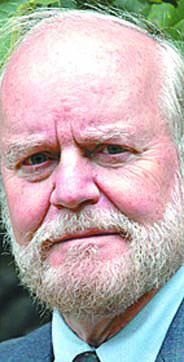As a youngster in the 1950s and ‘60s I got a healthy dose of insight from satirist Walt Kelly, creator of the daily comic strip “Pogo.”
Kelly’s satire revolved around a ‘possum named Pogo and his somewhat naïve and guileless friends and neighbors in Ok e fe noke e Swamp.
The bucolic setting that Kelly used was often visited by miscreants hustling a scam and looking for easy pickings among the unwary. They were so artfully caricatured that one could recognize the politician or huckster each represented, even before one echoed his signature shtick.
The starring denizens with Pogo (Albert the Alligator, turtle Churchie LaFemme, Howland Owl, and Porky Pine, the resident cynic) and a supporting cast of honest, hardworking creatures of the swamp were actually too unsophisticated to fall for the scams of these characters. They were so happy in their lives they couldn’t see any betterment in what the flimflammers offered.
It is from this simple lifestyle that Kelly wrote what would be used as a 1979 foreword of a reprinting of some of his “Pogo” strips.
“These continue to be wondrous times when every man tries to find a formula for keeping the stranger’s fingers from his throat. The simple expedient of holding hands will someday occur to a couple of people who will forever be forgotten. We need to read and to think and to study the faces of our friends … a peaceful pursuit … The study of peace is a blinky business.”
Kelly died in 1973, so he was gone before our formerly worst experience with a misguided politician had reached its climax in 1974.
Americans were not so vulnerable to misinformation (later to be “alternative” facts) and being exploited, en masse, for their fears and prejudices by politicians and broadcasters inventing problems and misdeeds then stoking those fears for their votes.
Like those happy dwellers of the swamp, most Americans could tell the good guys from the bad and didn’t brook bad behavior from politicians and celebrities.
Fifty years later things have changed.
There is no limit for some to the lies they’ll tell and the facts they’ll ignore.
And, unfortunately, to those who’ll believe them and how both threaten our democracy.
We should consider Mr. Kelly’s advice and make that “peaceful pursuit” of understanding each other. We need to relearn the allegiances we owe to our Constitution and our fellow citizens.
In our democracy we all have a say in our laws and their administration.
To live among others in harmony we agree to abide by those laws and understand that we all share the same limitations they put on our endeavors and behavior.
In a speech to the House of Commons Winston Churchill stated “[It] has been said democracy is the worst form of Government except for all those other forms that have been tried …” Democracy’s biggest strength is that, unlike all those other forms, we can criticize it and even bring about changes when government errs. We can make amendments and addendums to our Constitution when alterations in our society show the need for reconsideration.
Unfortunately, the biggest threat to democracy is that same exposure to unbridled criticism. Democracy has a long list of complaints from its citizens, which some see an inherent, damning weakness.
Those other forms of government that Churchill alluded to don’t have a long list of complaints. They have a nice clean slate of supposed satisfied citizens.
And why not? Autocrats excise their critics from public life: some by ridicule, others by banishment into the gulag, and some by assassination.
In the words of Kelly, “Now is the time for all good men to come to.”
(I pause for you to ruminate.) “Don’t believe something just because you didn’t read it in the papers. Wait until you haven’t seen it on television.”
In 1787 at the conclusion of the Continental Congress that approved sending the Constitution to the thirteen states for ratification, Benjamin Franklin was asked what type of government we had. He replied, “A Republic, if you can keep it!”
It’s a forever admonishment. For those who prefer a more authoritative voice of warning, I give you Jesus in Matthew 7:15-18: “Beware of false prophets, who come to you in sheep’s clothing but inwardly are ravenous wolves. You will know them by their fruits … A sound tree cannot bear evil fruit, nor can a bad tree bear good fruit.”
No mention of wolves-in-wolves’ clothing.
Presumably Jesus felt his followers would recognize them.

.jpg)


